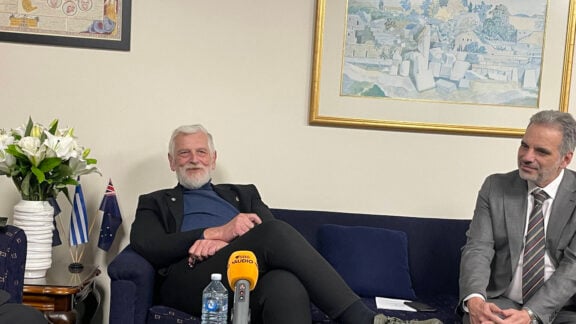At this moment in time, all eyes in the political scene are turning to Tom Koutsantonis. The man of the hour has just undertaken a huge task, in his combined duties as Treasurer and Energy Minister of South Australia: to implement a $550 million energy plan that includes the construction of a battery storage and gas-fired power plant. It is a groundbreaking, ambitious plan, announced by the South Australia Premier Jay Weatherill, which aims not only to cover the energy needs of the state, but also to offer a solution to the energy conundrum Australia is in at the moment. Promising a daring leap forward and embracing renewable energy (if only for part of the plan), South Australia is set to create hundreds of jobs and attract new investment.
Tom Koutsantonis may have insisted it was a “happy coincidence”, but the announcement did come only days after Tesla’s Elon Musk, the billionaire co-founder of the electric car company Tesla who is revered as a god in the world of business and innovation, promised on Twitter that his company could deliver 100-300MWh of battery storage to meet South Australia’s energy needs within 100 days of a contract being signed. Timing is essential in these matters and timing has found the Federal Government lagging behind, tangled up in indecision and its commitment to pursuing the interests of the dinosaur-era-relics exploiters, i.e. the fossil fuel energy industry.
Exposed for its lack of vision and indecisiveness to tackle energy issues, the Turnbull government was forced to jump up and announce another ambitious plan; the $2 billion expansion of the Snowy Hydro scheme that could add up to 50 per cent to its capacity. The new investment is aimed to add 2,000 MW to the hydro scheme’s 4,100 MW capacity, enough to power 500,000 homes. The project will include new tunnels and energy turbines to pump water uphill during off-peak times so it can generate electricity by flowing downhill when demand is high.
The Government was further ambushed on Thursday, when Energy Minister Josh Fydenberg had to endure the premier’s public shaming of him, when he said that “it is a little galling to be standing here next to a man who has been standing up with his prime minister bagging SA at every step of the way over the last six months to be standing here on this occasion, him suggesting that we want to work together”.
It was the moment of revenge by a politician known for his toughness, who this week showed Canberra what leadership looks like. He is not alone in this. Daniel Andrews has often showed this kind of leadership, swiftly moving to fill up the policy void left by the federal government. Only a week prior to the SA energy announcement, the Parliament of Victoria passed legislation permanently banning all onshore unconventional gas exploration and development, including hydraulic fracturing (‘fracking’) and coal seam gas. In an era when the quest for ‘clean’ energy becomes a pressing need, such policies show the way, offering a most welcome relief to farming communities and all those concerned about the destructive impact of fracking in the environment. It is not the only incident when the Premier of Victoria showed willingness to act decisively, show forward-thinking and embrace innovation.
The state’s plan to legalise medicinal cannabis is set to attract significant investment, create employment opportunities and make Victoria a leader in the respective research. When the government was trying to come up with a plan to deal with the referendum on marriage equality, the Parliament of Victoria was passing legislation, allowing for same-sex couples to adopt children. When the Federal Government gutted the Safe Schools anti-bullying program, the Andrews government embraced and continued to apply it in schools, teaching acceptance and inclusiveness. It promises to do the same with Sunday penalty rates, coming to the side of retail and hospitality employees (which form a large part of the population of a state with an economy largely reliant on hospitality). And on top of that, it introduced an ambitious plan to respond to the housing affordability crisis that plagues the nation. All strong, assertive motions to implement policy that works for the benefit of the broader community, creating employment opportunities, strengthening the social fabric, looking to the future.
Sure, the Andrews’ Government plan to abolish stamp duty will not bring down housing prices. And the Weatherill Government’s energy policy is not that ‘green’, as it still relies on gas. Politics, after all, include a large deal of compromise; but what we have recently seen in these states – as well as in Western Australia’s change of guard, with Mark McGowan getting strong support to implement an ambitious public transport policy – is that, in these times of change, what we need the most is decisive leadership and statemanship. Canberra should be taking notes.









